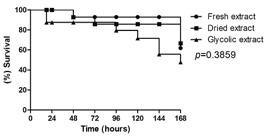Dried, fresh and glycolic extracts of Zingiber officinale were obtained to evaluate the action against G. mellonella survival assay against Enterococcus faecalis infection. Eighty larvae were divided into: 1) E. faecalis suspension (control); 2) E. faecalis + fresh extract of Z. officinale (FEO); 3) E. faecalis + dried extract of Z. officinale (DEO); 4) E. faecalis + glycolic extract of Z. officinale (GEO); 5) Phosphate buffered saline (PBS). For control group, a 5 μL inoculum of standardized suspension (107 cells/mL) of E. faecalis (ATCC 29212) was injected into the last left proleg of each larva. For the treatment groups, after E. faecalis inoculation, the extracts were also injected, but into the last right proleg. The larvae were stored at 37 °C and the number of dead larvae was recorded daily for 168 h (7 days) to analyze the survival curve. The larvae were considered dead when they did not show any movement after touching. E. faecalis infection led to the death of 85% of the larvae after 168 h. Notwithstanding, in treatment groups with association of extracts, there was an increase in the survival rates of 50% (GEO), 61% (FEO) and 66% (DEO) of the larvae. In all treatment groups, the larvae exhibited a survival increase with statistically significant difference in relation to control group (p=0.0029). There were no statistically significant differences among treatment groups with different extracts (p=0.3859). It may be concluded that the tested extracts showed antimicrobial activity against E. faecalis infection by increasing the survival of Galleria mellonella larvae.
Enterococcus faecalis; Zingiber officinale; host-pathogen interactions; Galleria mellonella.

 Thumbnail
Thumbnail
 Thumbnail
Thumbnail


